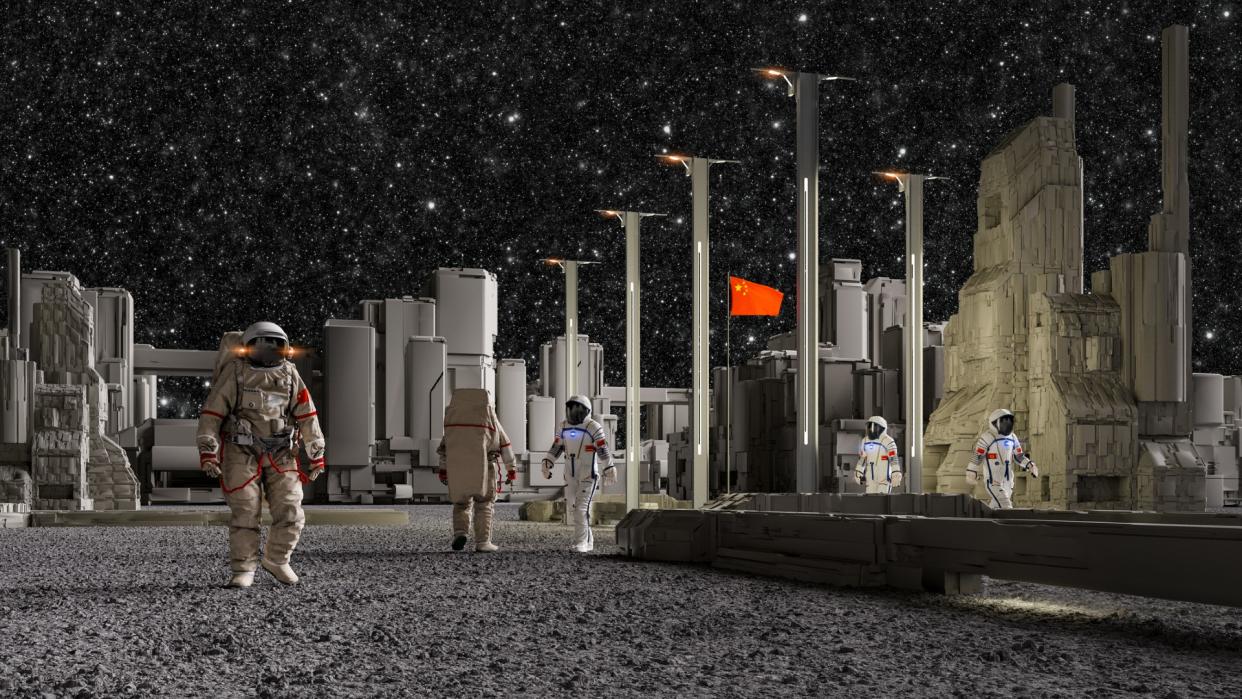China moving at 'breathtaking speed' in final frontier, Space Force says

COLORADO SPRINGS — China is ratcheting up its space capabilities at an impressive clip, with an eye toward challenging the United States' long-held supremacy in the final frontier, U.S. officials say.
That supremacy was established in dramatic fashion in 1969, when NASA's Apollo 11 touched down on the moon and ended the Cold War space race with the Soviet Union. This lunar achievement has had real and lasting consequences: The United States' unparalleled space assets have given the nation's military a powerful edge over the decades, providing information-gathering and communications capabilities that other countries couldn't match.
The rest of the world isn't necessarily content with this situation, however. In particular, China seems intent on rising up the space-power ladder, as U.S. officials have repeatedly pointed out over the past few years — including, once again, on Tuesday (April 9).
"Frankly, China is moving at a breathtaking speed. Since 2018, China has more than tripled their on-orbit intelligence, surveillance and reconnaissance satellites," Gen. Stephen Whiting, commander of U.S. Space Command, said here on Tuesday, during a talk at the 39th Space Symposium.
"And with these systems, they've built a kill web over the Pacific Ocean to find, fix, track and, yes, target United States and allied military capabilities," he added.
Related: 'We're in a space race:' NASA chief says US 'better watch out' for China
A "kill web," in case you were wondering, is "a dynamic network that seamlessly integrates intelligence and warfare capabilities across various domains, including land, sea, air, space and cyberspace," according to the U.S. Marine Corps.
And that's not all. China has also "built a range of counterspace weapons, from reversible jamming all the way up to kinetic hit-to-kill direct-ascent and co-orbital ASATs," Whiting said.
Indeed, China demonstrated direct-ascent ASAT, or anti-satellite, weapon technology back in January 2007, when it destroyed one of its defunct weather satellites with a missile. That test was widely decried as irresponsible, for it generated thousands of pieces of debris, many of which are still cluttering up Earth orbit.
Such activities show that China is now treating space as a war-fighting domain, Whiting said. And so, he added, is Russia, which has also conducted ASAT tests recently, including a destructive one in November 2021. Russia has also been aggressively building out its orbital architecture; since 2018, the nation has more than doubled its total number of active satellites, according to Whiting.
The U.S. government has taken notice of these trends.
"We are at a pivotal moment in history," Troy Meink, principal deputy director of the National Reconnaissance Office, which builds and operates the United States' fleet of spy satellites, said during a different talk on Tuesday here at the symposium.
"For the first time in decades, U.S. leadership in space and space technology is being challenged," Meink added. "Our competitors are actively seeking ways to threaten our capabilities, and we see this every day."
The U.S. must act if it wishes to beat back this challenge, Meink and Whiting stressed; it cannot rely on the inertia of past success to do the job.
For example, Meink highlighted the need to innovate with the nation's reconnaissance satellites, to make them more numerous, more agile and more resilient.
U.S. Under Secretary of Defense for Research and Engineering Heidi Shyu also emphasized the importance of increasing resilience, a goal that she said could be achieved by diversifying the nation's space capabilities.
"We must assess ways to incorporate radiation-hardened electronics, novel orbits, varied communication pathways, advancements in propulsion technologies and increased cooperation with our allies," Shyu said in another talk on Tuesday at the symposium.
Related: Is war in space inevitable?
RELATED STORIES:
— China plans to put astronauts on the moon before 2030
— US is in a new space race with China and Russia, VP Pence says
— US must beat China back to the moon, Congress tells NASA
Such conversations aren't unprecedented: While the specifics of the currently escalating great-power competition in space are new, the general idea is not, as Whiting pointed out.
"In reality, space was birthed in great-power competition," he said. "In 1957, the Soviet Union won the opening chapters of the space race when they launched the first object, the first man and the first woman, and that created a crisis of confidence, certainly, here in the United States."
The space race came and went without a war in the final frontier, and the same positive outcome is possible today, Whiting stressed.
"Let me be crystal clear: Those of us in U.S. Space Command do not want a war to start in, or extend into, space," he said. "War in space is not inevitable and, in fact, it would be detrimental to the United States, our allies and our way of life."
